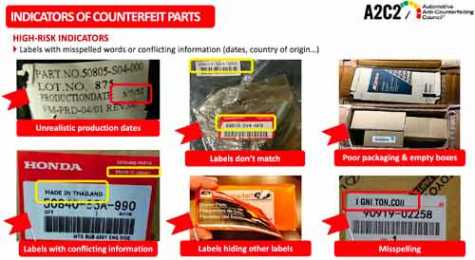The economic fallout from the coronavirus pandemic is likely to be felt worldwide, and that has law enforcement bracing for almost inevitable uptick in crime, including illegal business activity.
Shops should take a number of measure to avoid perpetuating---or falling victim to---criminal activity.
The Automotive Anti-Counterfeiting Council (A2C2), a coalition of 11 automakers, is reminding shops to avoid counterfeit airbags and other automotive parts.
Dee Pagdilao, of American Honda, said A2C2 offers a visual guide to some of the most common indications that a part may be counterfeit, including labels that don’t match one another (such as two different part numbers on the same package) or that cover other labels; labels with conflicting information (“made in Thailand” and “made in Japan”); or, most commonly, labels with odd misspellings of such common words as Ford.
Genuine automaker airbags are shipped one per box, with a “Class 9” hazardous material label, Pagdilao said; counterfeiters, however, often save money by shipping multiple airbags in a single box, or by skipping the hazardous material label.
Shops concerned a part they received may be counterfeit should contact the National Intellectual Property Rights Coordination Center (IPRC) (www.iprcenter.gov), part of the U.S. Immigration and Customs Enforcement and the U.S. Department of Homeland Security.
How can shops best avoid purchasing or installing counterfeit parts?
The first step is to know your parts supply chain, Abe Jardines of the IPRC said.
“My first job when I was 17 years old was delivering parts to auto shops in New Jersey for a local car dealer,” Jardines said. “Every guy at those body shops knew me by name, and I knew them by name. The next time my mom needed a body shop, I could call that guy up and say my mother is coming in. I knew who I trusted.
"That was knowing the supply chain. The internet kind of changed that. As great as the internet is at connecting people that are good, it’s also really good at connecting people who are bad with those who don’t know the other person is a bad source," Jardines said. "But at the end of the day, it all comes down to knowing your supply chain. If you can trust your supply chain, if you would put a part (you buy from a source) on your own car, we can’t ask for anything more from you.”
Authorities caution parts aren’t the only automaker product subject to pirating.
Shops buying an aftermarket scan tool should determine whether the tool maker licensed the needed information from the automaker, or just “reverse-engineered” it by putting an OEM scan tool on a vehicle and using monitoring equipment to determine the diagnostic routines to essentially copy.
Greg Potter, of the Equipment and Tool Institute, said it’s safe to say every manufacturer of aftermarket scan tools reverse-engineers to some degree.
“Even if you are given all the great data that you (license from) the OEMs, you still have to implement those features and functions into your aftermarket tool,” Potter said. “You have to validate and verify that that tool is doing what it’s supposed to do. How do you do that? You get the OEM tool, you send a command, you see what the reaction is, you monitor that traffic, and then you take your tool and you do the same thing.
"That’s your validation effort, back and forth. That can certainly be called reverse-engineering. You are monitoring the messages from the OEM tool and making sure your tool does the same thing and gets the same responses back.”
But Donny Seyfer, of National Automotive Service Task Force (NASTF), said it's not really that type of “professional” reverse-engineering that is a problem.
“It’s the, ‘How can we steal the software off the OEM tool and then sort of implement it into our own tool, and then sell it, in some cases representing it as an OEM tool,’ that’s the problem,” Seyfer said. “In some cases, they’re not even taking the (OEM tool) copyright information off. As you use it, you see that and say, ‘Huh, that’s not even the brand of the tool I’m using.’”
Seyfer that type of piracy undermines the companies producing both OEM and legitimate aftermarket tools.
“So if you buy those (pirated) tools just to save a few hundred bucks, and those other (legitimate scan tool) companies keep raising the prices because they’re spending all their time going to court (to fight the piracy,) now you’ll understand why,” Seyfer said. “Customs and border patrol snags these things constantly, by the case load. Truck loads in some cases.”
Jack Rozint, of Mitchell International, said his company’s software similarly gets pirated, and he said that the same online sources where that pirated software is being sold also often offers knock-offs of automaker scan tools for sale.











John Yoswick